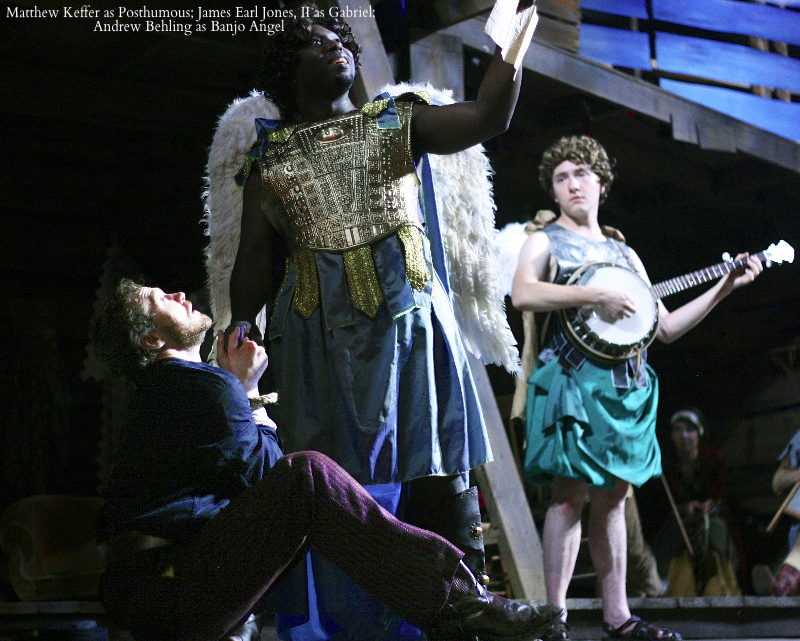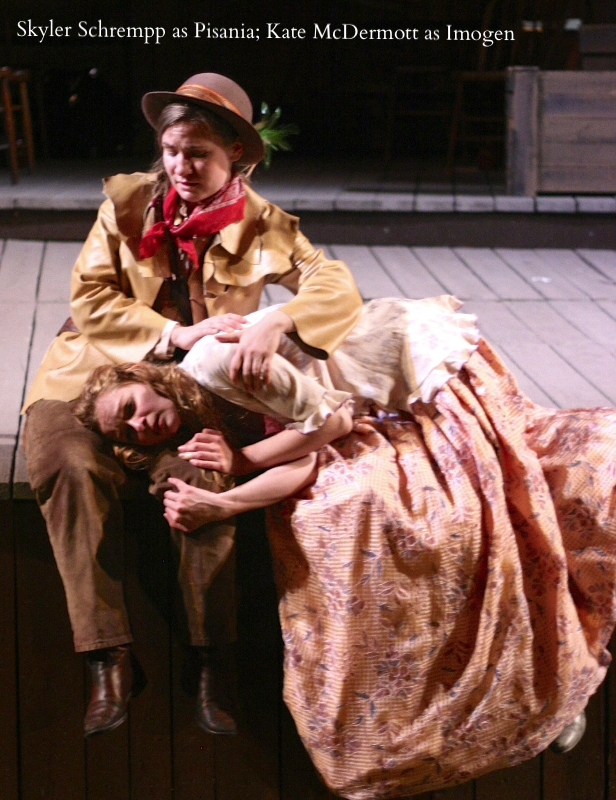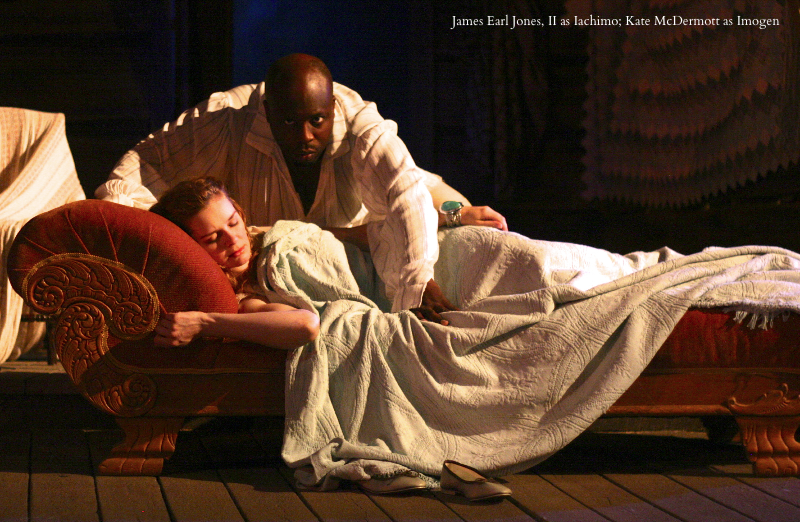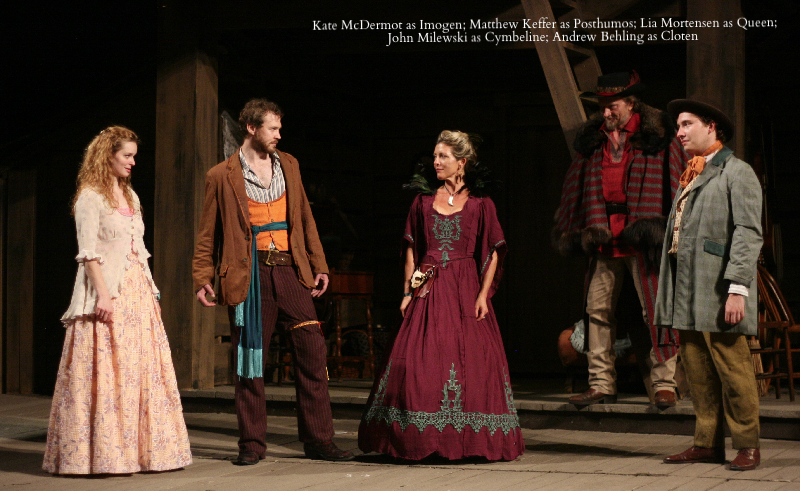– Joseph Jefferson Award Winning Show –
Cymbeline: A Musical Folk Tale
Adapted by
David Rice
Music and Lyrics by
Michael Keefe and David Rice
Pictured: Ryan Czerwonko as Cadmus, Kate McDermott as Imogen, Ron Keaton as Morgan and Tyler Rich as Polydore, July, 2013. Photo by D. Rice
The Story
About Cymbeline
Originally produced at First Folio Theatre in 2013, this unique production sets William Shakespeare’s Cymbeline in Appalachia during the Civil War. Its gorgeous music ranges in style from Bluegrass to Folk to Gospel.
Cast size from 18-22 actor/musicians with doubling and ample opportunities for cross-cultural and gender-reversed casting.
Now available for licensing.

Winner of two 2013 Chicago Equity Joseph Jefferson Awards:
New Adaptation – David Rice
Original Score – David Rice & Michael Keefe
Cadmus
Polydore
Queen
Posthumus
Imogen
King Cymbeline
Pisania
Cloten
Cloten’s Servant
Philario
Iachimo
Cornelia, the Wise Woman
Helene
Messenger
General Lucius
Gabriel
Angels
Gaoler
Valeria, a Soothsayer
Ensemble/Musicians
“Staged with sly wit and plenty of heart…featuring ingratiating and heartfelt songs!”
★ ★ ★ ½
Chicago Tribune

“Lyrical and witty…with a roots music score which helps tell the story and comment on it at the same time”
Huffington Post
“An eccentrically entertaining winner…with music and lyrics worthy of a Blue Ridge songcatcher”
Sun-Times News Group

““Clever and endearing…the fusion of Bard and Bluegrass is both fun and fine. ”
★ ★ ★
Chicago Daily Herald
Full Reviews
‘Cymbeline: A Folk Tale With Music’ ★ ★ ★ ½
June 23, 2013 | By Kerry Reid | Special to the Tribune
Within the Shakespearean canon, there are “problem plays,” such as “Measure for Measure.” And then there’s “Cymbeline,” which is a portmanteau piece caught somewhere between comedy, romance and self-parody. (A rom-arody?) At any rate — it’s loopy, as anyone who has tried to summarize the convoluted story for a newbie can attest.
“Well, there’s this king, Cymbeline, and his daughter Imogen marries a commoner, Posthumus, but Posthumus gets exiled by Cymbeline and then the princess goes through a failed seduction by Posthumus’ friend, Iachimo, and she ends up running off to the woods and dressing as a boy and reuniting with her kidnapped brothers that she doesn’t know are her brothers and she takes poison, except it’s not really poison, and there’s a war and then Jupiter arrives in a dream and everyone is happy and forgiven at the end — except for that one beheaded guy, but he had it coming.”
But for all its excess, “Cymbeline” ultimately offers a touching paean to reconciliation between individuals and warring armies. It is also the source of possibly the most beloved song in all of Shakespeare, “Fear no more the heat o’ th’ Sun, nor the furious Winter’s rages,” crooned by Imogen’s brothers at her funeral. When they still think she’s a boy — and they don’t know she’s really alive. And related to them.
So it actually makes sense — as much as anything in the world of this play can — to turn it into a Civil War-era Appalachian tall tale with folk songs. That’s what David Rice does with his adaptation for First Folio’s charming outdoor production, staged with sly wit and plenty of heart by Michael Goldberg and featuring ingratiating and heartfelt songs (including a lovely take on “Fear No More”) by Rice and Michael Keefe.
Here, Cymbeline (John Milewski) is a West Virginia patriarch trying to avoid paying war taxes to the Union Army, represented by General Lucius (Robert Tobin). There is a touch of the film “Cold Mountain” in the relationship between pure-hearted Imogen (Kate McDermott) and Posthumus’ servant, Pisania — who is usually “Pisanio,” but who, in Skyler Schrempp’s fiery tomboy performance, is transformed into something akin to Renee Zellweger’s Ruby. And yes, “complicated family relationships” and “West Virginia” have served as reliable, if crude, punch lines for years. To its credit, this production mostly avoids the easy laughs along those lines.
Cornelia (Victoria Blade), the “wise woman” who provides Imogen’s scheming stepmother (Lia Mortensen) with the sleeping potion, feels right in line with generations of Appalachian wildcrafters and provides a hilarious summary of offstage events. Ronald Keaton’s Morgan, the kidnapper/adoptive father of Cymbeline’s sons, has a rascally mountain-man aura that lends itself well to his framing role as narrator. Andrew Behling as Cloten, Imogen’s stepbrother, plays the mean-as-a-polecat villain to the hilt.
Matthew Keffer plays up the narcissistic self-dramatizing excess of Posthumus — but then again, heroines ending up with men who aren’t quite worthy of them is a recurring motif in Shakespeare. “Cymbeline” reminds us that in love and war, across the ages, we all learn to forgive and to settle for what we can get.
Appalachian Setting and Music Illuminate Cymbeline at First Folio
Kelly Kleiman, Huffington Post
Perhaps the highest compliment that can be paid to a fresh interpretation of Shakespeare is that it makes you want to go back and re-read the play. This is pretty rare — ordinarily an audience’s reaction to the Bard in swimsuits is that it knows perfectly well what the play is about, and that what was on the stage wasn’t it — but it does happen in First Folio’s lyrical production of Cymbeline.
Cymbeline is one of those Shakespeares you’re sure you must have seen once but can’t remember worth a damn. And as I summarize the plot you’ll understand why your memories are so vague: the play is a thing of shreds and patches, a mishmash of Othello, Romeo & Juliet, The Winter’s Tale, Twelfth Night and several others. King Cymbeline’s evil wife wants his virtuous daughter Imogen to marry her idiot son, but Imogen has secretly married Posthumus, who then encounters Iachimo, who bets he can seduce the bride and then manages to persuade Posthumus he’s done so. When the desolate bridegroom tries to arrange to have Imogen killed, she takes poison and appears dead but then awakens in the home of her long-lost… and so on.
In adapter David Rice’s witty conceit, this ragout becomes rabbit stew, with Cymbeline as head of a gang of West Virginia ruffians who refuse allegiance to either side during the American Civil War. It’s hard to imagine a more powerful expression of isolation threatened by outside forces than the Appalachia of 1863.
The setting also gives director Michael Goldberg numerous opportunities to make light of even the weightiest of characters. Cymbeline’s blood enemy is here portrayed as a mountain man in the Ewell Gibbons mode, complete with rabbit carcasses around the neck. The son who aspires so hopelessly to Imogen’s hand owes much to Jethro from “The Beverly Hillbillies” — or is it the other way around?
Most important, though, the setting gives composer-lyricists Rice and Michael Keefe the opportunity to create a roots-music score which helps tell the story and comment on it at the same time. Maybe it’s just a happy accident that American hill-country music grew straight out of Elizabethan melodies, just as backwoods English is a direct offshoot of Shakespeare’s own. Or maybe these facts were the inspiration for the entire show. In either case, few instruments convey either merriment or mourning more successfully than country fiddle.
Bliss it is to see this difficult play so well done; but to see it under the stars among the trees on the Mayslake Estate is very heaven. The theater provides citronella candles but bring bug-spray anyway; and during this climate-change summer neither a sweater nor a raincoat will come amiss. I promise you, though — if you brave “wind and rainy weather” to see Cymbeline, you won’t forget it again.
Twangtastic ‘Cymbeline’ is easy to enjoy
Catey Sullivan, July 12, 2013
In the august pantheon of Shakespearean monologues, you can’t top the over-the-top soliloquy in the playwright’s wackadoodle drama “Cymbeline.”
Yes, yes, I know — King Lear and Hamlet get (respectively) the Bard’s iconic, brilliant “Blow winds, and crack your cheeks” /”To be or not to be” oratories. But neither of them gets to deliver their power speeches whilst embracing a bloody, headless corpse. That honor goes to Imogen, leading lady of the preposterously plotted, oddly titled “Cymbeline.” (Oddly titled because the title character barely rates second banan status in the story).
The story is a zany doozy. It has all the usual suspects of a Shakespearean plot — cross-dressing runaways (see also “As You Like It” an “A Midsummer Night’s Dream”), evil stepmothers (“Titus Andronicus”), poison that makes you look dead even though you’re totally not (“Romeo and Juliet”), local yokel foster parents (The Winter’s Tale), virgins getting slutshamed (“As You Like It”), long-lost siblings reuniting with their parents (“The Comedy of Errors”), wise fools (the ‘Henrys’, “Twelfth Night,” “King Lear”) and a scheming frenemy (“Othello”).
But while the tropes are familiar, “Cymbeline” plays like a cracked fun-house mirror version of Shakespeare. Everything is weirdly goofy even the hapless, headless fellow. Director Michael Goldberg embraces the crazy in his staging of “Cymbeline” for Oak Brook’s First Folio Theatre. So does adaptor David Rice, who moves the play to Civil War-era Appalachia and, with Michael Keefe, incorporates twangtastic folk-music into the narrative.
Rice and Keefe take big risks in rejiggering the lyrics of Shakespeare’s song-filled original, and those risks pay off. Consider the openin number, wherein a cast wielding guitars, mandolins, banjos, washboards and fiddles sets the scene with some musical exposition. When they get to the part where the potato-brained Cloten (rhymes with “cotten”) is introduced, the music abruptly stops as one of the backwoods troubadours asks a question that’s been bugging me ever since I read “Cymbeline” as an undergrad. “Seriously?” he says, “We’re really sure his name is Cloten?”
Then there’s the wise old mountain man Morgan’s solemn explanation of the etymology of Posthumus Leonates’ unusual name: “It means ‘son of a dead lion’ or something.”
In short, First Folio’s production is an eccentrically entertaining winner. In long, the convoluted story (bear with me here) concerns the plight of the aforementioned Imogen (Kate McDermott, appropriately girlish and gritty). She’s the spunky daughter of Cymbeline, a Virginia landowner so rich the locals just call him King (John Milewski). Figuring in Imogen’s woes: a scheming stepmother (a Cruella DeVilicious Lia Mortensen) who wants Imogen to wed her cloddish son Cloten (Andrew Behling, hilariously brimming with the sort of whiney entitlement that makes you want to punch a person in the face). Imogen loves another (of course she does), and has secretly married Posthumus (Matthew Keffer).
Complications ensue after Posthumus heads for the hills where he is convinced by the duplicitous Iachimo (James Earl Jones II) that Imogen is a wanton strumpet. Meanwhile, Imogen also flees home, and is taken in by the grizzled old mountain man (or is he?) Morgan (Ronald Keaton, channeling Jeremiah Johnson-era Will Geer) and his two sons (or are they?) Polydore and Cadwal.
I suppose this is a good time to note that by the close of Act IV, at least four of the principal characters are operating under assumed names and that in Act V, the Angel Gabriel (Jones) shows up as a gospel singer sporting a really bad Shirley Temple coiffure.
In other words, if you want to keep track of precisely who is doing what to who and why in the tale of “Cymbeline” you need a spreadsheet. If you just want to enjoy the giddy outlandishness of this so-called tragedy (which it totally isn’t) all you need to do is sit back and relax. First Folio makes “Cymbeline” easy to enjoy. Kudos to Rice and Keefe, who penned the music and lyrics to a score that’s worthy of a Blue Ridge songcatcher. Also deserving praise: Angela Weber Miller, whose scenic design evokes both the Blue Ridge mountains and the hardscrabble cabins of 1860s Appalachia. Finally, Jones raises the roof as the otherwordly singer sent to make sure everything winds up happily-ever-after.
Bard meets bluegrass in First Folio’s fine, folksy ‘Cymbeline’
By Scott C. Morgan
If there are any purists out there who will take offense at First Folio’s folk music-filled adaptation of Shakespeare’s “Cymbeline” at Oak Brook’s Mayslake Peabody Estate, they’ll likely be in the minority.
“Shakespeare’s Cymbeline: A Folk Tale with Music” is the official title for David Rice’s clever and endearing world premiere adaptation, which resets the Bard’s tale of a mythical British kingdom to West Virginia in 1863 (the same year that Union state was officially founded during the Civil War). Rice and music director Michael Keefe also contribute lots of foot-stomping bluegrass and folk-styled songs to the show, which implies a dramatic framing device of a bunch of Appalachian mountaineers who have put their creative heads together to add their own flourishes to one of Shakespeare’s lesser-known plays.
If the effect brings to mind the Coen Brothers’ film “O Brother, Where Art Thou?” — which freely reinterpreted Homer’s “The Odyssey” as a convict getaway caper set in 1930s Mississippi — then all the better since First Folio’s updating turns out to be plenty of fun, too.
Rice and Keefe can get away with mentions of the Union Army and President Abraham Lincoln in part because Shakespeare’s “Cymbeline” (pronounced like “Sim-bel-lean”) is not nearly as beloved by the public or esteemed by critics as his better-known plays. “Cymbeline’s” overabundant and hodgepodge plotting feels cherry-picked from better Shakespeare plays (for instance, Imogene must disguise herself as a boy like the heroines of “Twelfth Night” and “As You Like It,” while a magical false death potion similarly causes plenty of confusion as in “Romeo and Juliet”). The characters in “Cymbeline” also aren’t nearly as complex.
But in an Appalachian-imposed guise, “Cymbeline” takes on the sheen of an often outrageous American tall tale involving Princess Imogen (Kate McDermott), whose love marriage to a commoner is scorned by the defiant rebel King Cymbeline (John Milewski) and his wicked second Queen (Lia Mortensen). There are even two long-lost royal children in the mix (Ryan Czerwonko as Cadmus and Tyler Rich as Polydore), both abducted by the wronged Lord Morgan (Ronald Keaton). So even if the original rushed happy ending of “Cymbeline” is dramatically suspect, First Folio’s adaptation makes it all feel perfectly akin to a hokey 19th century melodrama.
First Folio’s production abounds with talent, especially in the case of the acting company. Many actors double as fine bluegrass musicians, particularly Andrew Behling on the banjo as the Queen’s comically vainglorious son, Cloten, and Skyler Schrempp on the fiddle as the wily servant Pisania (a gender switch from Pisanio in Shakespeare’s original).
In the vocal department, James Earl Jones II is resplendent with a powerful baritone voice as both the scheming Iachimo and the Angel Gabriel, who appears in a dream to Imogen’s husband, Posthumus (another good singer in Matthew Keffer). Director Michael Goldberg makes the many twists and turns of “Cymbeline” clear and vivid while utilizing the talents of his ensemble to great effect.
So banish any doubts you might have about the Bard being mixed with bluegrass music. It may not be pure Shakespeare, but the fusion is both fun and fine.
Production Videos
Contact
For licensing or more information contact David Rice at drice@firstfolio.org or fill out the form below.

